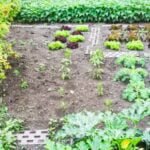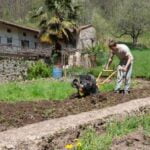Can you use fish pond water for vegetable gardens? Using fish pond water as a source of nutrients for vegetable gardens is a practice that has gained popularity among gardeners. It offers an alternative to traditional fertilizer, and proponents argue that it can promote healthier plant growth and better soil health. However, there are also concerns about potential risks and drawbacks associated with using fish pond water, such as the introduction of harmful pathogens or pollutants into the garden environment.
Using fish pond water for vegetable gardens involves the transfer of nutrient-rich water from a fish pond to nourish the plants. The water contains various nutrients, including nitrogen, phosphorus, and potassium, which are essential for plant growth. Additionally, fish waste in the water provides organic matter that can improve soil fertility and structure.
Despite the potential benefits, there are also concerns about using fish pond water for vegetable gardens. There is a risk of introducing harmful pathogens or pollutants from the fish pond into the garden environment, which could pose a threat to plant health and human consumption.
It is essential to consider these potential risks before deciding to use fish pond water in vegetable gardens. Consequently, proper testing and precautions should be taken to ensure the safety and quality of the water used for irrigation purposes.
The Nutrient Content of Fish Pond Water
Using fish pond water to fertilize vegetable gardens can be a sustainable and cost-effective way to provide essential nutrients to plants. Fish pond water is rich in various nutrients that can benefit the growth and development of vegetable plants, making it a valuable resource for gardeners.
Essential Nutrients
Fish pond water contains essential nutrients such as nitrogen, phosphorus, and potassium, which are crucial for the healthy growth of vegetable plants. These nutrients help promote root development, improve flowering and fruiting, and enhance overall plant vigor. Additionally, fish waste in the pond contributes to the water’s nutrient content, providing an organic source of fertilizer for vegetable gardens.
Microbial Activity
In addition to macro-nutrients, fish pond water also contains beneficial microorganisms that can improve soil health and support plant growth. These microorganisms play a vital role in breaking down organic matter, releasing nutrients into the soil, and enhancing nutrient uptake by plants. The presence of these microorganisms in fish pond water can contribute to a thriving ecosystem within the vegetable garden.
Potential Benefits for Vegetable Plants
By utilizing fish pond water as a natural fertilizer, vegetable plants can experience improved nutrient uptake, enhanced resistance to stress or disease, and increased productivity. The diverse array of nutrients present in fish pond water can contribute to well-rounded nutrition for vegetables, resulting in healthier and more robust plants with higher yields.
Overall, the nutrient content of fish pond water makes it a valuable resource for enhancing the health and productivity of vegetable gardens. However, it is essential to assess the quality of the water and consider potential risks before using it in your garden.
Potential Risks and Concerns
Using fish pond water for vegetable gardens can be a beneficial practice, as it provides a natural source of nutrients that can promote plant growth and soil health. However, there are also potential risks and concerns associated with using fish pond water that gardeners should be aware of.
One of the main concerns when using fish pond water for vegetable gardens is the risk of introducing harmful pathogens or pollutants to the plants and soil. Fish excrement and decaying organic matter in the pond can lead to the presence of bacteria, parasites, or other microorganisms that could potentially harm vegetable crops.
Additionally, if the fish pond has been treated with chemicals or medications, there is a risk of residual contaminants that could negatively impact plant growth and human health.
To mitigate these risks, it is important to test the quality of the fish pond water before using it in vegetable gardens. This can be done by conducting thorough water quality testing to ensure that it meets safe standards for use on edible crops. Additionally, implementing proper application methods and best practices can help reduce the likelihood of introducing harmful pathogens or pollutants to the garden environment.
In summary, while using fish pond water for vegetable gardens can provide valuable nutrients and benefits for soil health, it is essential to be mindful of the potential risks and concerns associated with this practice. By taking proactive measures to assess water quality and implement safe application methods, gardeners can effectively utilize fish pond water in their vegetable gardens while minimizing potential drawbacks.
Water Quality Testing
When considering using fish pond water for vegetable gardens, it is essential to ensure that the water meets safe standards to avoid any potential risks or contamination. Testing the quality of fish pond water before using it in your vegetable garden is crucial for the health and well-being of both your plants and yourself. Here are some important steps and methods for testing the quality of fish pond water:
- Chemical Testing: Conduct chemical tests to determine the levels of ammonia, nitrites, nitrates, and pH in the fish pond water. High levels of these compounds can be harmful to vegetable plants, so it is important to monitor and adjust them accordingly.
- Pathogen Screening: Test for the presence of harmful bacteria, parasites, or viruses in the fish pond water that can pose a risk to human health and contaminate vegetable crops.
- Heavy Metal Analysis: Check for heavy metal contaminants such as lead, arsenic, and mercury that can leach into fish pond water from surrounding soil or industrial runoff.
By conducting these tests regularly, gardeners can ensure that their fish pond water meets safe standards for use in vegetable gardens. It is also important to keep records of test results over time to track any changes in water quality.
Furthermore, seeking professional advice or consulting with local agricultural extension services can provide valuable insights into the specific requirements and regulations for using fish pond water in vegetable gardens. Ultimately, proper testing and monitoring can help mitigate potential risks and ensure that fish pond water is a beneficial resource for nurturing healthy and thriving vegetable plants.
Application Methods
When it comes to using fish pond water for vegetable gardens, there are various application methods that can be employed to make the most of this natural fertilizer. One option is direct watering, where the fish pond water is applied directly to the soil around the base of the vegetable plants. This method can provide immediate access to the nutrients present in the water, allowing the plants to benefit quickly.
Another effective way to utilize fish pond water in vegetable gardens is by creating compost tea. Compost tea is a liquid fertilizer that is made by steeping compost in water and then applying the resulting solution to plants. By using fish pond water as the base for compost tea, gardeners can further enhance its nutrient content and provide their vegetables with a rich source of organic matter.
In addition to direct watering and compost tea, some gardeners also use drip irrigation systems or soaker hoses to distribute fish pond water throughout their vegetable gardens. These methods can help ensure thorough and even coverage, promoting consistent growth and health for all crops. Experimenting with different application methods can help determine which approach works best for a specific garden and its unique needs.
Overall, employing multiple application methods for fish pond water can maximize its benefits for vegetable gardens while also ensuring efficient use of this valuable resource.
| Application Method | Description |
|---|---|
| Direct Watering | Fish pond water applied directly to the soil around vegetable plants |
| Compost Tea | Fish pond water used as a base for creating nutrient-rich compost tea |
| Drip Irrigation/Soaker Hoses | Fish pond water distributed through irrigation systems for even coverage |
Benefits for Soil Health
Using fish pond water for vegetable gardens can be a beneficial practice when it comes to improving the soil structure, fertility, and overall health of the garden. Fish pond water is rich in nutrients like nitrogen, phosphorus, and potassium, which are essential for plant growth and development. When used in vegetable gardens, this nutrient-rich water can enhance the soil’s fertility and provide a natural source of nourishment for the plants.
One of the key benefits of using fish pond water in vegetable gardens is its ability to improve soil structure. The organic matter and nutrients present in the water can help to increase the soil’s water-holding capacity and improve its overall texture. As a result, the plants are better able to access water and nutrients, leading to healthier growth and increased yields.
Furthermore, using fish pond water in vegetable gardens can contribute to the overall health of the soil. The beneficial microorganisms present in the water can help promote healthy soil biology, creating an environment that is conducive to plant growth. This can lead to improved disease resistance in plants and reduced reliance on chemical fertilizers or pesticides.
| Benefit | Description |
|---|---|
| Improved Soil Structure | Fish pond water enhances the soil’s texture and water-holding capacity. |
| Increased Fertility | The nutrient content of fish pond water nourishes plants and enriches the soil. |
| Enhanced Soil Health | The microorganisms in fish pond water promote healthy soil biology, leading to improved plant resilience. |
Best Practices and Tips
When considering the use of fish pond water for vegetable gardens, it is essential to follow best practices and tips to ensure that this method is used effectively and safely. By implementing the following advice, gardeners can maximize the benefits of fish pond water while minimizing any potential risks.
Proper Dilution
One important tip for using fish pond water in vegetable gardens is to properly dilute it before applying it to the plants. While fish pond water can be rich in nutrients beneficial for plant growth, it can also be high in nitrogen, which may cause harm if used in its concentrated form.
Diluting the fish pond water with clean, fresh water can help mitigate any potential issues and ensure that plants receive the nutrients they need without being overwhelmed by excessive nitrogen.
Regular Testing
To ensure that the fish pond water is safe for use in vegetable gardens, regular testing of its quality is crucial. Testing can help identify any potential contaminants or harmful pathogens that may be present in the water, allowing gardeners to take appropriate measures to address these issues before using the water on their plants. By conducting regular tests, gardeners
Application Timing
The timing of application is another key factor when using fish pond water in vegetable gardens. It’s advisable to apply the water during cooler parts of the day, such as early morning or late evening, to minimize evaporation and ensure maximum absorption by the plants’ roots. Additionally, avoid applying fish pond water right before heavy rainfall, as this
By incorporating these best practices and tips into their gardening routine, individuals
Conclusion
In conclusion, the use of fish pond water for vegetable gardens can be both beneficial and potentially concerning. The nutrient content of fish pond water can provide essential elements for plant growth and contribute to soil health. However, there are also potential risks and concerns, such as the introduction of harmful pathogens or pollutants. It is crucial for gardeners to weigh these factors carefully before deciding whether or not to use fish pond water in their vegetable gardens.
Water quality testing is an essential step in determining the suitability of fish pond water for use in vegetable gardens. By ensuring that the water meets safe standards, gardeners can mitigate potential risks and optimize the benefits of using fish pond water. Additionally, applying best practices and following recommended application methods can help minimize any negative impact on plant health and soil quality.
Ultimately, while using fish pond water in vegetable gardens can have its advantages, it is important for gardeners to exercise caution and take proactive measures to ensure the safety and effectiveness of this practice. With proper testing, application methods, and consideration of potential risks, incorporating fish pond water into vegetable gardening routines can be a sustainable and beneficial choice for promoting healthy plant growth and soil fertility.
Frequently Asked Questions
Can I Water My Vegetable Garden With Lake Water?
Yes, you can water your vegetable garden with lake water, but it’s important to be cautious. Lake water may contain pollutants or harmful bacteria, so it’s best to have it tested before using it on your edible plants.
What Is the Best Water for Growing Vegetables?
The best water for growing vegetables is clean, pH-balanced, and free from contaminants. Rainwater and well water are generally good options, but if using tap water, let it sit to allow chlorine to dissipate.
Is Pond Sediment Good for Gardens?
Pond sediment can be beneficial for gardens as it contains nutrients that can enrich the soil. However, too much pond sediment can lead to compacted soil or nutrient imbalances, so it’s important to use it in moderation and ensure proper soil management.

If you’re looking to get into vegetable gardening, or are just looking for some tips on how to make your current garden better, then you’ve come to the right place! My name is Ethel and I have been gardening for years. In this blog, I’m going to share with you some of my best tips on how to create a successful vegetable garden.





